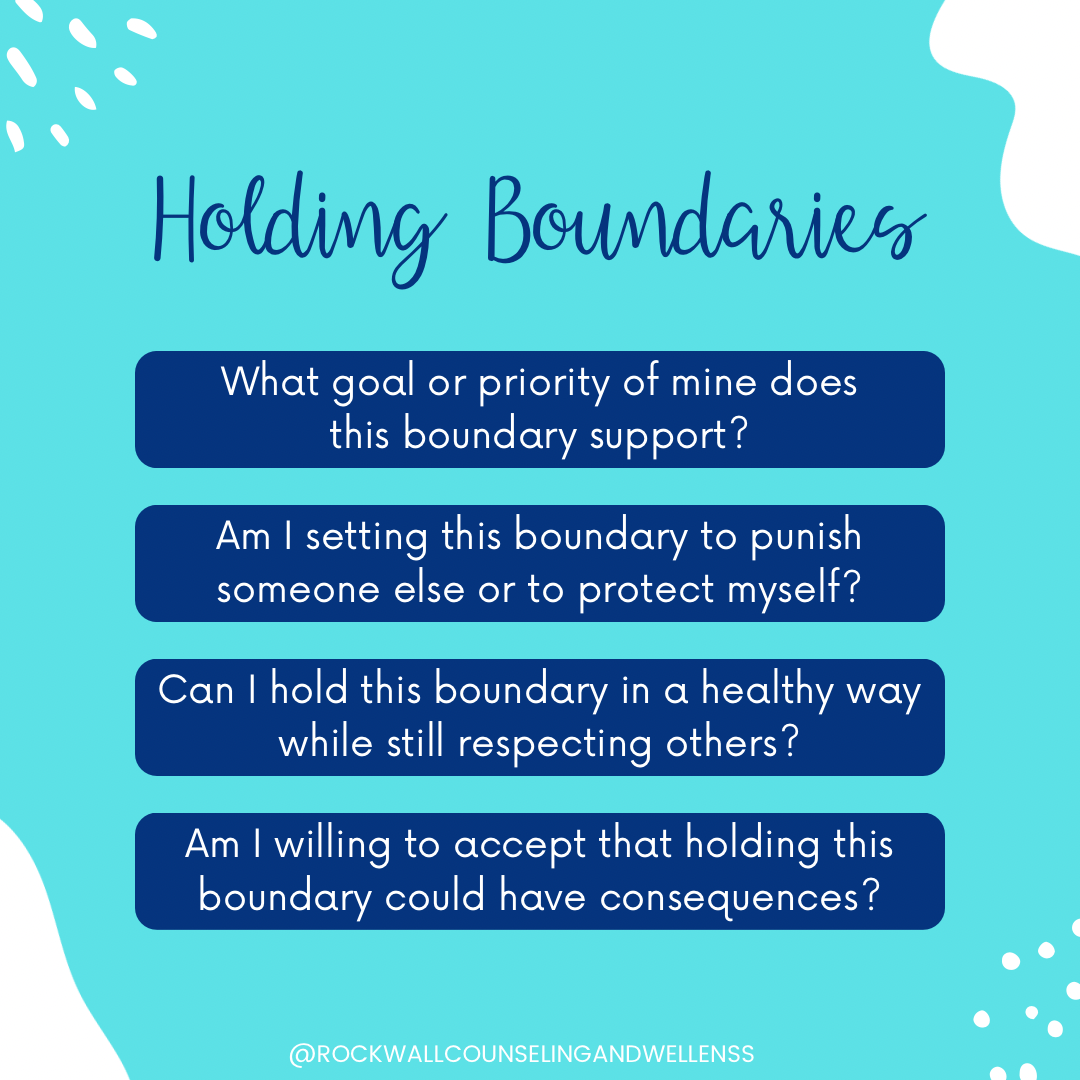Boundaries. Though this idea is not a new one for mental health professionals or those of us who have participated in counseling or therapy, setting healthy boundaries is one of those topics you may have heard of recently in the news or on social media. The word itself may sound harsh or punitive, but in fact boundaries are an important part of any healthy relationship and can allow you to prioritize your time, mental health, and emotional health. Learning to set boundaries at work, at home, and in your relationships can positively impact your self-esteem by allowing you to disengage from unhealthy patterns in a way that is respectful of the other party and your own values. By evaluating what it is you want to prioritize in different situations, you can learn where to set boundaries and how to respectfully enforce them.
areas TO CONSIDER SETTING BOUNDARIES
Boundaries in the workplace. One area of your life where you may want to consider setting boundaries is with your work. Western and particularly American culture are extremely work and task driven, and while this can certainly allow us to be successful in reaching goals, too often people find balancing work life and home life incredibly difficult. An example of setting a boundary at work might be to communicate with your employer or supervisor the hours you’ll be available and whether or not you’ll be responding to emails or other work related communication outside of your time in the workplace. For example, if you want your weekends to be solely for family time, but your supervisor sends emails over the weekend, you may need to set a boundary by communicating, “I understand that there are things that may come up outside of business hours, however, my unpaid weekend time is for my family. I will not be dealing with work issues during these times, and will instead respond when I return to the office on Monday mornings. Thank you for respecting this.” Notice that this boundary isn’t punitive. It places the responsibility for holding the boundary with you, not your employer. You’re planning to prioritize your time with your family because it is what you value.
Boundaries in romantic relationships. This can be such a tricky area in which to set boundaries, but is also one of the most important. Whether a dating relationship or marriage, romantic relationships need the trust, respect, and safety that healthy boundaries create. One example of a boundary you may discuss with your spouse could be how you speak to one another in moments of conflict or argument. It could sound something like, “Because I feel emotionally triggered when I am yelled at, I will not engage in any conversation where there is yelling. If you yell during an argument, I will disengage until I know we can continue the conversation in a de-escalated way.” Again, this has more to do with what you will tolerate rather than controlling the behavior of the other person. You’re the one responsible for removing yourself from the situation rather than just telling them to stop yelling.
Boundaries with family members. Just like with romantic relationships, boundaries within your family can be challenging. No one wants to feel that they’ve alienated someone they love by setting a boundary. But it’s also important to remember that boundaries don’t exist to harm the other person but rather to preserve your own priorities. Any number of areas with family can be something you set a boundary regarding - visits, time spent together, conversation topics, privacy, etc. One common boundary people set within families surrounds the types of conversations that you want to have or not have. You may, for example, not want to engage in political conversations with family members because, while you respect their differing view from yours, you feel it always escalates and causes tension. You might set a boundary from this by saying, “I can tell you feel really strongly about this topic, and I know it’s important to you. However, I won’t discuss it with you. Talking about this topic is not more valuable than our relationship, and I don’t want to cause tension between us.” You may also run into issues with family members and your children if you are a parent. Often parents set boundaries to protect their children’s mental health from situations that may arise with family members. Whether it is in regard to your parenting style, what your children wear, their eating habits, or their behavior, if you feel your child is being negatively impacted by the input of others, especially if it is unsolicited input, it is okay to set a boundary regarding this.
THINGS TO CONSIDER WHEN SETTING A BOUNDARY
As we’ve mentioned, setting boundaries can seem tricky and even unnatural if you’re a people pleaser or used to setting your own wishes aside to make others comfortable. If you’re new to setting healthy boundaries for yourself, consider the following questions as you try to figure out the process:
What goal or priority of mine does this boundary support?
Am I setting this boundary to punish someone else or to protect myself?
Can I hold this boundary in a healthy way while still respecting others?
Am I willing to accept that holding this boundary could impact my relationship with others, even if that is not a reflection of myself?
Learning to set healthy boundaries can be a truly revolutionary practice in your life, as it ensures that relationships you keep support you and don’t impact you negatively. They are an empowering way to keep your priorities in alignment while still respecting others. If you need help learning more about boundaries or how to implement them into your life, click the link below to find which one of our Rockwall area counselors can help you learn about this important practice!
Written by Emily Taylor, Contributing Writer

